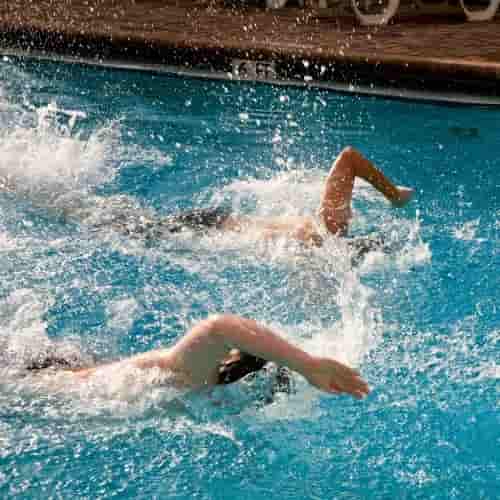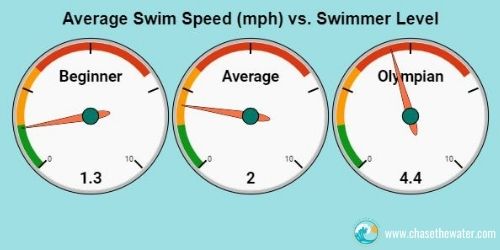Knowing how fast you swim can be a good motivator to track your progress. In addition, it can give you the inspiration you need to work on technique and progress your swimming fitness.
As a general guide, if you can swim at a speed of 2mph (miles per hour), you can consider yourself a good average swimmer. This swimming speed is approximately the same as swimming 25 meters in 30 seconds.
Unless you are a competitive swimmer, you should not take swim speeds too personally as there is not enough recorded data available to give a definitive answer for recreational swimmers.
The data I have complied is from my own research, with data gathered from recorded swim meet times and asking recreational swimmers about their experience.
It might be nice to know how fast of a swimmer you are, but the fact that you are swimming regularly for fitness at all puts you ahead of 90% of the population. [source]

How Fast Is An Average Swimmer?
The average swimmer will swim at a speed of 2 miles per hour.
To give that speed some context, the average walking speed for most people is between 3 to 4 miles per hour. [source]
Although these average speeds depend on a wide variety of factors, such as your age, fitness level and swim technique, 2 miles per hour is generally accepted as the average swim speed.
The following shows how a beginner swimmer, average swimmer and Olympic swimmer compare when swimming the front crawl over a distance of 200m.
| Swimmer Level | Swim Distance | Average Swim Speed (mph) |
|---|---|---|
| Beginner | 200m | 1.3 |
| Average | 200m | 2 |
| Olympian | 200m | 4.4 |

It is important to point out that these speeds are based on averages over 200m, so speeds will decrease.
An Olympic swimmer such as Michael Phelps can hit speeds that are greater than 5.5mph over some strokes and shorter races. [source]
How Fast Do You Swim?
Do you think you are a fast swimmer? How do you know for sure?
If you are looking to improve your swimming speed, it’s nice to know what your current pace is so you can see yourself improve.
Below is some detailed information on how to work out if you are a fast swimmer.
First, you need to establish how fast you are currently swimming. There are two ways to do this:
- Use a smart watch which will give you speeds, distances, times.
- Use the clock on the pool wall to time how long it takes you to swim one length.
Using A Smart Watch To Measure Swim Speed
Some smartwatches are really clever and will tell you your average pace. I recently purchased a very affordable smartwatch, the Amazfit Band 5 for only £25 and I am super impressed with all the data it records as I swim, including:
- Number of Laps
- Total Strokes
- Average Pull Distance
- SWOLF – a score that measures swimming efficiency.
- Best Pace (aka speed)
- Heart Rate.
From this, I can see my best swim speed per 100m, which tells me how fast I swim.

Using The Pool Clock
If you do not have a fitness watch or tracker, you can simply look at the swim clock on the wall of your local pool and time how long it takes you to swim one length of the pool.
In the UK, public swimming pools (particularly if they are competition pools) typically have a large clock with detailed seconds. There are usually two clocks, one at both ends of the pool, so you can always see it. Both clocks are synched.
When you time how long it takes you to swim one length of the pool, you will need to use the following formula to work out your swim speed.
Speed = Distance / Time
If you do not want to work this out yourself, here is an excellent free online calculator that you can use.
How Do You Know If You Are A Good Swimmer?
If you swim solo, with no feedback, it’s difficult to determine how good of a swimmer you are.
For swimming enthusiasts, it’s nice to know how you stack up and where you should improve.
Although there is no definite answer to this question, there are a few things you can measure to determine if you are a good swimmer.
1. Speed
There is a general consensus that if you can swim fast, then you are most likely a good swimmer.
I would agree with this to an extent, but don’t forget that technique is just as important as speed for recreational swimmers.
For me, good technique is preferable over speed, as a good swim technique ensures that:
- I avoid injury
- I can swim for longer without getting tired.
2. Swimming Long-Distance
Another way to tell if you are a good swimmer is if you can swim long distances without getting tired. If you can do this, then you are also a good swimmer.
To swim long-distance, you need good technique. Good technique equals a good swimmer.
To learn more about how you can swim for longer without getting tired, check out this article which covers this topic in greater detail, How To Swim For Longer Without Getting Tired?
3. Floating
Finally, another way to tell if you are a good swimmer is if you are able to stay afloat in the water.
Many people think they can swim but are unable to tread water or stay afloat for longer periods of time.
Being able to float or tread water is an essential life-saving skill and if you can float or tread water with ease, this shows a good level of water confidence.
How Can You Swim Faster?
There are certain things you can do to help you to progress and swim faster
1. Keep Your Legs High
In order to swim fast, you need to be as streamlined as possible in the water with minimal drag.
This means keeping your legs high in the water, as sinking legs will create drag and slow you down.
The quickest fix if this is a problem for you is to press your chest and head down into the water until you feel the upward force from the water.
By pressing your head and upper chest down, your legs will pop up and, therefore, create less drag as you swim.
2. Improve You Ankle Flexibility
More flexible ankles will result in a more efficient kick as you displace more water.
The more efficiently you can use your ankles in your kick, you will have greater power and propulsion which will help your speed.
3. Practice Your Dolphin Kick
A great way to find some speed in the pool is to have a powerful underwater dolphin kick.
As you push off from the wall, having a good underwater kick will give you extra speed and power and set your body in fast motion, which you can try to maintain.
4. Use A Tempo Trainer
Often the downside of swimming fast for the average swimmer is a reduction in swimming technique.
Average swimmers tend to swing their arms and splash as they increase their speed.
Using a tempo trainer, which is a small device that emits a “beep” at a set interval, you can time your hand entry position with each beep.
With time, you can increase the speed of the beeps and, as a result, you will increase the speed of your stroke.
As it will condition you to swim in time with the beep, hopefully, you will maintain your good technique as you gradually pick up speed.
5. Extend Your Body – Be Streamlined
When you swim, it helps to be as streamlined as possible in the water in order to swim as fast as you can.
One tip to become streamlined is to reach your hand out in front of you as you perform the front crawl. The idea is to extend your reach as if you were trying to reach out and touch the far pool wall.
This will have the effect of making your body more streamlined in the water.
In addition, the reaching can have the effect of giving your hips greater rotation, which will increase your speed.
To learn more about improving your swim technique to swim faster, I recommend you check out the Total Immersion Swim Method.
Final Thoughts
Swim speeds can be a great way to motivate yourself by comparing your progress with others.
If you’re proud of the speed you swim at, then congratulations! You are an above-average swimmer and should feel confident in what you’ve accomplished so far.
Remember that there is not enough data available for recreational swimmers out there to really compare yourself to others, but it’s still rewarding to track your progress.
It never hurts to try new techniques or work on improving your swimming technique as this will help improve your swimming fitness too!
Whatever your current swim speed, as long as you are getting into the pool and having fun, that is the most important thing.
Happy swimming!
